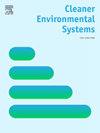克服可再生能源采用的障碍:战略评估和实施优先级的决策框架
IF 4.9
Q2 ENGINEERING, ENVIRONMENTAL
引用次数: 0
摘要
从化石燃料转向可再生能源对可持续发展至关重要。然而,广泛的经济、技术、监管和社会障碍阻碍了这一转变。本研究旨在确定这些障碍,并提出优先的策略来克服它们。提出了一种新的决策框架,将自适应的质量功能部署(QFD)模型与一种新的混合模糊多准则决策(MCDM)方法相结合,称为模糊ARASKOR (F-ARASKOR)方法。数据收集包括一次深度专家访谈和四份结构化问卷,由领域专家小组完成。首先,从文献中确定了可再生能源发展的综合障碍清单。使用第一份问卷评估其重要性权重。然后,通过专家访谈得出克服障碍的策略,并使用QFD方法通过第二份问卷进行分析。接下来,根据七个标准对这些策略进行评估:对障碍的影响、实现成本、持续时间、能力、风险、复杂性和可接受性。采用第三份问卷,通过层次分析法(AHP)获得各指标权重,并通过第四份问卷对战略绩效进行评价。使用F-ARASKOR方法进行最终排序。结果确定了75个障碍和38个策略。其中,“政策稳定性和长期承诺”、“促进可再生能源作为气候解决方案”和“发展培训和认证计划”成为优先战略。该研究为政府和行业制定稳定、有针对性的政策,进行有效的投资,解决阻碍可再生能源发展的关键障碍提供了实践指导。本文章由计算机程序翻译,如有差异,请以英文原文为准。
Overcoming barriers to renewable energy adoption: A decision-making framework for strategy evaluation and implementation prioritization
Transitioning from fossil fuels to renewable energy is essential for sustainable development. However, a wide range of economic, technical, regulatory, and social barriers hinder this transition. This study aims to identify these barriers and propose prioritized strategies to overcome them. A novel decision-making framework is developed, combining an adapted Quality Function Deployment (QFD) model with a new hybrid fuzzy Multi-Criteria Decision-Making (MCDM) method, named the Fuzzy ARASKOR (F-ARASKOR) method. Data collection involved one in-depth expert interview and four structured questionnaires, completed by a panel of domain experts. First, a comprehensive list of barriers to renewable energy development was identified from the literature. Their importance weights were assessed using the first questionnaire. Then, strategies to overcome the barriers were derived through expert interviews and analyzed via the second questionnaire using a QFD approach. Next, these strategies were evaluated against seven criteria: impact on barriers, implementation cost, duration, capability, risk, complexity, and acceptability. Criterion weights were obtained through the Analytic Hierarchy Process (AHP) using the third questionnaire, and strategy performance was assessed through the fourth. Final prioritization was conducted using the F-ARASKOR method. The results identified 75 barriers and 38 strategies. Among them, “Policy Stability and Long-Term Commitment,” “Promote Renewable Energy as a Climate Solution,” and “Develop Training and Certification Programs” emerged as top-priority strategies. This study offers practical guidance for governments and industries to formulate stable, targeted policies, make effective investments, and address the key barriers hindering renewable energy development.
求助全文
通过发布文献求助,成功后即可免费获取论文全文。
去求助
来源期刊

Cleaner Environmental Systems
Environmental Science-Environmental Science (miscellaneous)
CiteScore
7.80
自引率
0.00%
发文量
32
审稿时长
52 days
 求助内容:
求助内容: 应助结果提醒方式:
应助结果提醒方式:


